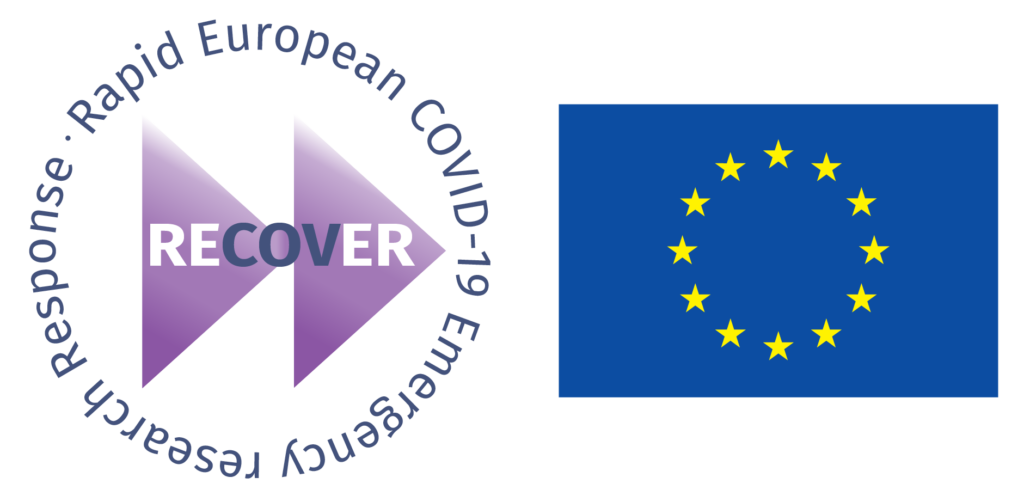Publications - July 2020

Preprint and peer-reviewed publications from RECOVER’s studies
Ten days after the first reported case of SARS-CoV-2 infection in the Netherlands, 3.9% of healthcare workers (HCWs) in nine hospitals located in the South of the Netherlands tested positive for SARS-CoV-2 RNA. The extent of nosocomial transmission that contributed to the HCW infections was unknown. Although direct transmission in the hospitals cannot be ruled out, the data does not support widespread nosocomial transmission as source of infection in patients or healthcare workers. (Sikkema et al. 2020).
Laboratory preparedness with quality-assured diagnostic assays is essential for controlling the current coronavirus disease (COVID-19) outbreak. We conducted an external quality assessment study with inactivated severe acute respiratory syndrome coronavirus 2 (SARS-CoV-2) samples to support clinical laboratories with a proficiency testing option for molecular assays. To analyse SARS-CoV-2 testing performance, we used an online questionnaire developed for the European Union project RECOVER to assess molecular testing capacities in clinical diagnostic laboratories.
With confirmed cases of COVID-19 declining in many countries, lockdown measures are gradually being lifted. However, even if most social distancing measures are continued, other public health measures will be needed to control the epidemic. Contact tracing either via conventional methods or via mobile app technology is central to control strategies during de-escalation of social distancing. It is therefore essential to identify key factors for a contact tracing strategy (CTS) to be successful.
(Kretzschmar et al. 2020)
Laboratory preparedness with quality-assured diagnostic assays is essential for controlling the current coronavirus disease (COVID-19) outbreak. We conducted an external quality assessment study with inactivated severe acute respiratory syndrome coronavirus 2 (SARS-CoV-2) samples to support clinical laboratories with a proficiency testing option for molecular assays. To analyse SARS-CoV-2 testing performance, we used an online questionnaire developed for the European Union project RECOVER to assess molecular testing capacities in clinical diagnostic laboratories.
During the ongoing COVID-19 pandemic, health-care workers are at a substantially increased risk of becoming infected with severe acute respiratory syndrome coronavirus 2 (SARS-CoV-2) and could come to considerable harm as a result. Depending on the phase of the pandemic, patients with COVID-19 might not be the main source of SARS-CoV-2 infection and health-care workers could be exposed to atypical patients, infected family members, contacts, and colleagues, or live in communities of active transmission. Clear strategies to support and appropriately manage exposed and infected health-care workers are essential to ensure effective staff management and to engender trust in the workplace. These management strategies should focus on risk stratification, suitable clinical monitoring, low-threshold access to diagnostics, and decision making about removal from and return to work. Policy makers need to support health-care facilities in interpreting guidance during a pandemic that will probably be characterised by fluctuating local incidence of SARS-CoV-2 to mitigate the impact of this pandemic on their workforce.
The world is entering a new era of the COVID-19 pandemic in which there is an increasing call for reliable antibody testing. To support decision making on the deployment of serology for either population screening or diagnostics, we present a comprehensive comparison of serological COVID-19 assays. We show that the assay detecting total immunoglobulins against the receptor binding domain of SARS CoV-2, had optimal characteristics for antibody detection in different stages of disease. (van Kessel et al. 2020).
As France experiences the first wave of COVID-19 pandemic in lockdown, intensive forms of social distancing are required in the upcoming months due to the currently low population immunity. Extensive case finding and isolation would allow the partial release of the socio-economic pressure caused by extreme measures, while avoiding healthcare demand exceeding capacity. Response planning needs to urgently prioritize the logistics and capacity for these interventions.
